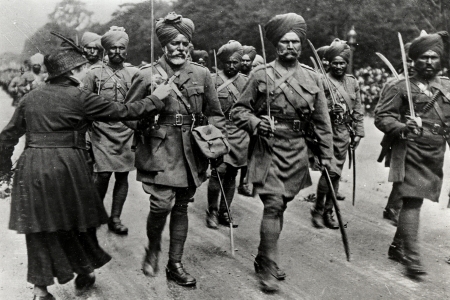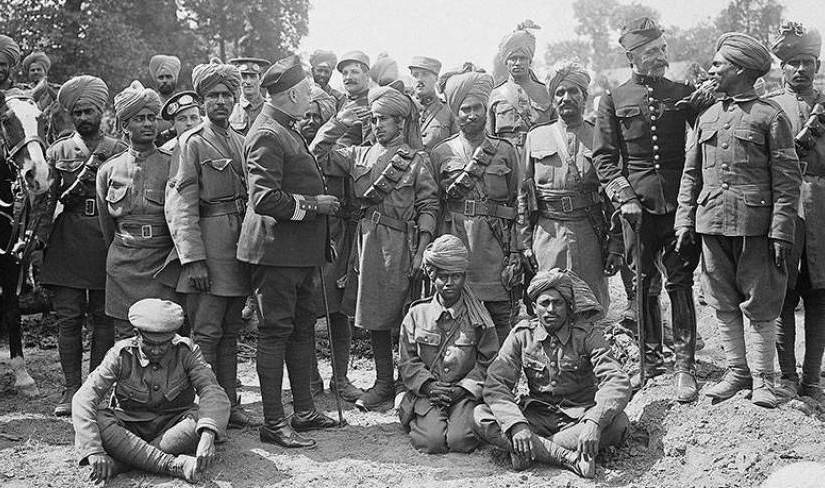India and World War 1
WW1’s significance for India
- The world war ended the myth of invincibility of British Empire in India as the British faced many humiliating defeats during the war
- The soldiers that returned after war raised the morale of masses.
- India supported Britain in world war on its promise of fighting for democracy but serving Indian with Rowlat act immediately after war shattered Indians. This led to the rise of national consciousness and soon Non Cooperation movement was launched.
- Formation of USSR also led to the rise of communism in India with the formation of CPI and imparted a socialist tinge to freedom struggle.
Nature of the troops:
- At first, much recruitment was, notionally, voluntary. But, as in India, local political elites were incentivised to supply manpower, and they used all means at their disposal to push villagers into service.
Why did India support British’s war efforts?
- Indian nationalism, at that time, was dominated by moderates who believed that if India contribution to the British war efforts would result in British’s benevolence towards the natives and would grant us more constitutional reforms
- Indian army was aloof from the nationalist movement as magazines,newspapers were not allowed in the barracks and so they fought for the British Raj
Contribution:
- The Empire’s biggest contribution was by India. This included 3.7 million tonnes of supplies, over 10,000 nurses, 1,70,000 animals, £146m of Indian revenue, and political support — including that of Gandhi, who helped recruit Indian volunteers in the face of nationalist opposition.
- Indian Army: the largest volunteer force in the world, which provided 1 million troops to serve overseas.
- Over 74,000 were killed — five times more than the combined death toll from every war that India has fought since independence — and 80,000 were held prisoner.
Achievements:
- Protected the northwest of India, buttressed British garrisons in Egypt, Singapore and China, as well as contributing to seminal battles of the Western Front, such as the Somme and Neuve Chapelle. At Ypres, in particular, Indian casualties were exceptionally high, compounded by the shock of German chlorine gas in April 1915.
- Greatest impact in West Asia: with 60% of all Indian troops serving in Mesopotamia (modern day Iraq), and another 10% in Egypt and Palestine. On Jerusalem’s capture the next year, it was Indian Muslim troops who were tasked with protecting the Dome of the Rock.
India Gate
- Viceroy laid the foundation stone in 1921
- For the Indians who fought for the Empire, earning a staggering 13,000 gallantry medals in the process, this legacy of ignorance is a scandal.
India and World war 2

Battle of Kohima and Imphal:
- It was the bloodiest battle of World War II fought in India
- In two weeks of fighting, thousands of soldiers died, the charging Japanese troops were killed by almost continuous firing from British and Indian machine guns
- The battle was last year voted as Britain’s greatest battle, beating Waterloo and D-Day, in a contest by Britain’s National Army Museum last year
- The Japanese regard the battle of Imphal to be their greatest defeat ever.
- But the battle has been largely forgotten in India as an emblem of its colonial past
- It gave Indian soldiers a belief in their own martial ability and showed that they could fight as well or better than anyone else.
In both WW1 and WW2 Indian soldiers formed the backbone for Great Britain’s land forces as Britain’s main advantage was its naval power. Millions of Indian soldiers and volunteers participated in both wars on Britain side. in would be no exaggeration to say that without Indian soldiers, Britain might have lost the war and Germany would have conquered Europe.
Indian leaders’ reaction:
- The left saw it as people’s war as USSR was involved. They supported British war efforts and the ban on them was removed
- Mahatma Gandhi at first did not want to take advantage of British’s troubles with war, but after Cripps’ mission failed(could not guarantee dominion status) and as the Japanese were right at the borders of India, he started the Quit India movement.
Aftermath of WW2:
- Britain was now too weak to remotely govern India and also they understood that their hegemony over Indian people has eroded and they can no longer hold the subcontinent without using violence
- There was overwhelming popular support cutting across religions and classes for people who joined INA(Indian national army) and fought along side the Japanese. This one the warning signal to British.
- The labor party which came to power was sympathetic to India’s aspirations and soon declared independence

One thought on “Role of India in WW1 and WW2 and what are its effects on India”